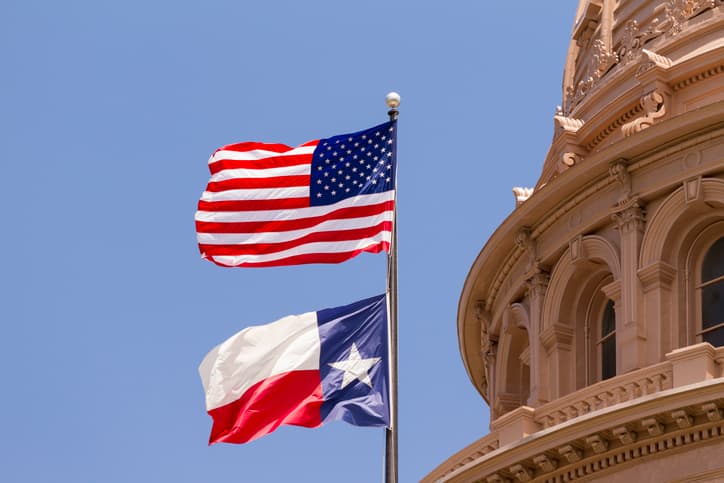Will America Honor Its Guarantee to Texas?
The principle on which Texas is standing in its feud with the federal government over the southern border is embedded in our Constitution and woven by Texas into the American flag.

Young Texas came of age quite young
And then she married Uncle Sam,
She sewed her star fast to his flag,
And it shall shine there while there’s a rag.
— “Uncle Sam & Mexico” *
Will President Biden honor America’s guarantee to the Lone Star State? That’s the question in what is shaping up as a Texas-sized constitutional conundrum over who is in charge of enforcing the border. Governor Abbott has gone so far as to declare Texas is under “invasion” by migrants from countries to the south. That, he says, breaches Uncle Sam’s constitutional “guarantee” to the states, in Article IV, section 4, to “protect each of them against Invasion.”
One can’t blame Texas for being irate over this failure on the part of President Biden and the federal government. Texas, after all, was a sovereign republic of its own prior to 1845, when it stitched its star to Old Glory. It joined the union in part because of that federal guarantee. The doughty Texans had already won their independence by beating a Mexican army at San Jacinto in 1836. A debate ensued as to whether to accede to America.
The second president of the Texas republic, Mirabeau Lamar, was adamant against submerging the independent Lone Star state under the federal leviathan. “The annexation of Texas,” he warned during his inauguration in 1838, would be “the grave of all her hopes of happiness and greatness.” It would mean “that the blood of our martyred heroes had been shed in vain.” Yet Texans voted to accept America’s offer of statehood — annexation — in 1845.
If the union of the two republics resembled a kind of matrimony, as the old tune “Uncle Sam & Mexico” suggests, then the rumblings of discontent along the border with Mexico today could be seen as a vindication of the old quip, “Marry in haste, repent at leisure.” For years, the Lone Star state has been groaning under the burden of largely unchecked migration from Mexico and other Latin American nations, straining Texan budgets and resources.
Just to mark the point, this newspaper favors robust immigration from all quarters. The kind of immigration we support, though, is legal, constitutionally regulated entry according to law. We want no part of any nativist scorn for the strivers plunging across the Rio Grande, but no one is helped by an out-of-control, illegal invasion of a foreign population at enormous cost — not only along the border, but nationwide — to our states, cities and towns.
This scourge appears to be worse than ever on Mr. Biden’s watch. “He has smashed records for illegal immigration,” Mr. Abbott contends, and decries the “cartels smuggling millions of illegal immigrants across the border.” In sum, he reckons “the federal government has broken the compact between the United States and the States,” and Mr. Biden in particular has failed to honor the constitutional vow in Article IV, section 4.
Mr. Abbott also invokes what Justice Antonin Scalia called “the States’ sovereign interest in protecting their borders,” marked in Article I, section 10 of the parchment. That forbids the states from engaging in war, “unless actually invaded” or in “imminent Danger.” This, Mr. Abbott argues, “reserves to this State the right of self-defense.” Texas law professor Stephen Vladeck, grandson of The Great Judith Vladeck, calls that a “dangerous misreading.”
That’s because Section 10 is a list of things states can’t do. The Great Scalia, though, saw that the provision Mr. Abbott cites “leaves intact” the states’ “inherent power to protect their territory.” Scalia’s insight came in 2012 in the case of Arizona v. United States. Like Texas today, Arizona at the time was strained by migration and sought to tackle it more effectively than the federal government chose to do. Arizona lost at the Supreme Court by five to three.
That led Scalia to dissent that, “as a sovereign, Arizona has the inherent power to exclude persons from its territory, subject only” to limits in the Constitution or set by Congress — neither of which applied to Arizona then, or Texas today. “Indivisible” is how Scalia described America’s “Union of sovereign States.” That, after all, was Texas’s understanding when it joined. It looks to us as if Mr. Biden is duty-bound to honor America’s guarantee to the Lone Star.
____________
* “Rough & Ready Songster.” New York: Cornish, Lambert, & Company, circa 1848, via theAlamo.org

